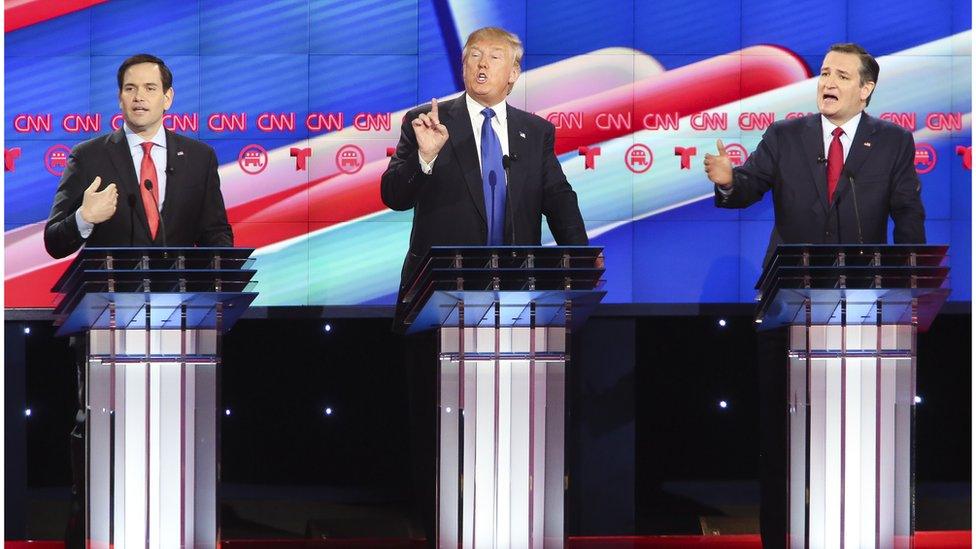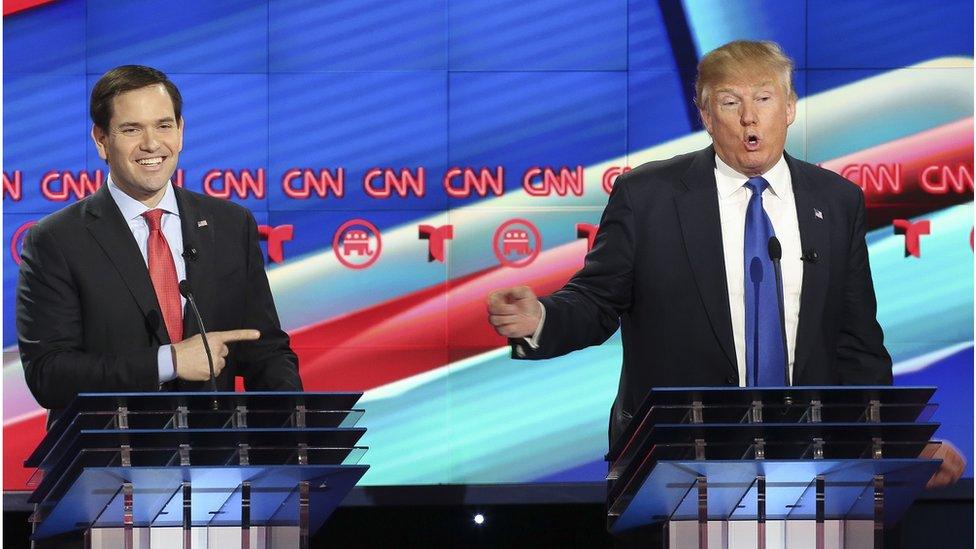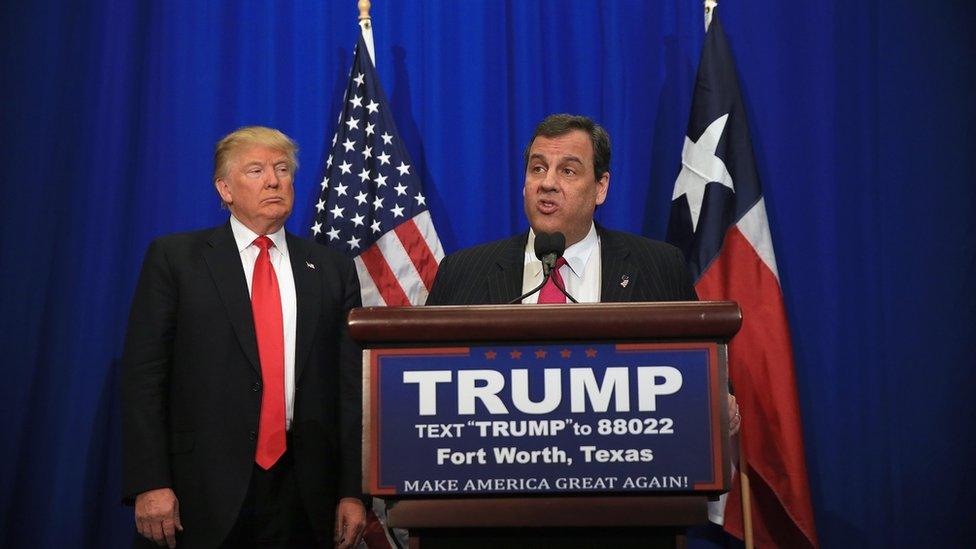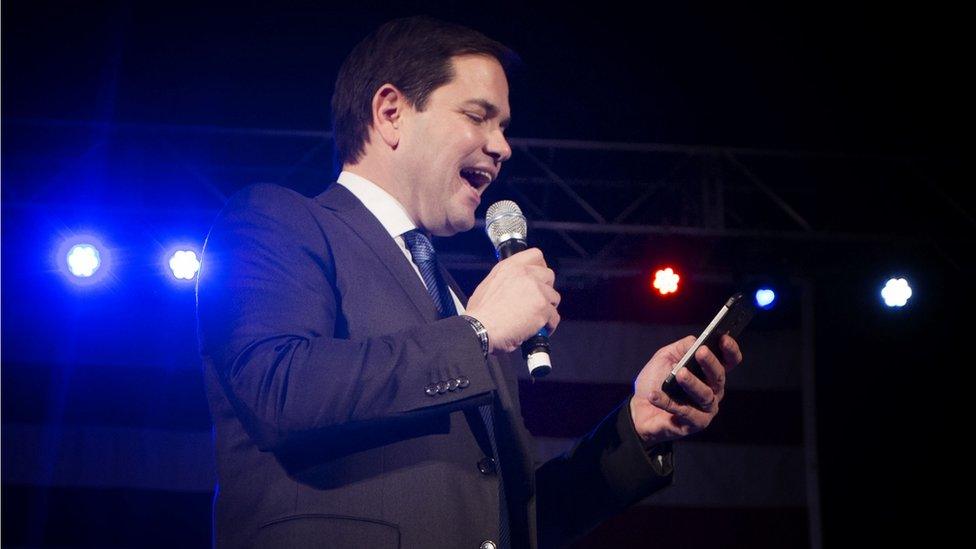US election 2016: Day one of the Republican civil war
- Published

Well, that's it then. The Republican Party has come unglued. It's been a long time in the making, but the day of reckoning is finally here.
For decades there's been an uneasy alliance between the various factions within the Republican Party. The business interests have joined with social conservatives and economic populists to form a governing coalition.
At least it was a governing coalition before Barack Obama won two straight presidential races and fashioned an electorate made up of the young, minorities and women that has significantly tilted the playing field toward Democrats for the foreseeable future.
While thanks to population distribution and electoral district map-making Republicans seem secure in their hold on the US Congress, Mr Obama has proven that the power of the presidency matters most. Presented with this frustration, the Republican Party is tearing itself asunder.
Donald Trump is leading a movement of populists and some disaffected evangelicals against the reigning establishment - and he's now on the verge of total victory. What once seemed to be an impossible feat could, with sweeping wins in primary contests over the next two weeks, become a new, very different reality.
All this was laid bare in a series of remarkable events over the last 24 hours.


Republican debate - shots fired
The big question going into Thursday night's Republican debate in Houston was whether, with their backs to the wall, Mr Trump's two main challengers would launch a full-scale assault on the frontrunner.
Within the first few minutes it became clear that they would. Marco Rubio tore into the New Yorker's business record. Ted Cruz questioned his conservative credentials. Both mocked his lack of policy details. The blows came fast and hard.
This was not the first time a presidential competitor had gone after Mr Trump of course. But up until now the attacks had always come from the desperate margins.
In July former Texas Governor Rick Perry called Mr Trump a "cancer on conservatism, external". By mid-September he was out of the race.
Then Louisiana Governor Bobby Jindal went after the New Yorker, labelling him a narcissist and an egomaniac who was "full of foolishness and nonsense, external". He suspended his campaign in November.
Jeb Bush was the next to make an attack run, tweeting earlier this month that the billionaire was a liar, a loser and a whiner, external. Last Saturday Mr Bush's presidential quest ended.
Now the fusillade against Trump is coming from the men standing next to him on the debate stage. There are no desperate margins anymore. The desperation has reached all the way to the top.

Trump mocks Rubio's water cravings
A new kind of war
As he has when confronted with attacks in the past, Mr Trump launched a storm the following day against his aggressors.
He tweeted that Mr Rubio was a lightweight and Mr Cruz was a liar. He said the Floridian "looks like a little boy on the stage" and the Texan is a "nasty guy".
At a rally on Friday the insults continued. He said that Mr Rubio was a "nervous basket case" who "was putting on makeup with a trowel".
The difference this time, though, is that Mr Rubio is responding in kind. Gone is the noble, high-spirited talk of his humble beginnings and desire to launch a "new American century". Instead Mr Rubio's rallies on Friday seemed more like a late-night stand-up comedy act.
Mr Rubio read Mr Trump's tweets and mocked his typos.
"Is that how they spell 'choker' at the Wharton School of Business?" he quipped. He called Mr Trump a "con man" who "spent a career in business sticking it to the little guys."
He even said that Mr Trump was powdering his "sweat moustache" during breaks at the debate and had requested a full-length mirror, maybe "to check if his pants were wet".
For months Mr Trump has been operating on a different rhetorical level than his presidential opponents. It's as though he were telling his booming crowds that he thinks the whole US political process is a reality-TV joke - and he, for one, is going to let them in on it.
Meanwhile serious politicians gave serious speeches, and Mr Trump ate them alive, one by one.
On Friday Mr Rubio decided to play the game by Mr Trump's rules. At this point, however, the New Yorker may have an insurmountable head start.


The Christie dilemma
The biggest bombshell of the past 24 hours came when Mr Trump took the stage in Dallas on Friday morning, flanked by former Republican adversary Chris Christie.
The New Jersey governor's endorsement marks a turning point in the Republican nomination fight. Up until now Mr Rubio has dominated the establishment endorsement battle. Mr Trump's allies were a collection of political has-beens and fringe personalities.
Mr Christie, however, is as establishment as they come. He's the former head of the powerful Republican Governors Association. He was the keynote speaker at the 2012 Republican National Convention. With his support, it's impossible to characterise Mr Trump as a hostile outside force anymore. Mr Trump's scary political phone calls are coming from INSIDE THE HOUSE.
This blockbuster endorsement reveals a classic example of the prisoner's dilemma game theory dynamic, external for prominent Republican officeholders.
If they all stick together, there's a chance they could prevent Mr Trump from winning the nomination. But the benefits of breaking from the pack and supporting the New Yorker now may be too tempting to resist.
By being one of the first to endorse Mr Christie grabs a front seat in Mr Trump's new Republican order. Expect others to follow, as Maine Governor Paul LePage did later on Friday.
The gates are open, and the stampede could be about to begin.


Rubio mocks Donald Trump's tweets
And now what?
So is this the beginning or the end? Will Mr Trump and his new band of supporters take over the Republican Party?
The next few weeks will tell us a great deal, as his competitors - Mr Cruz, Mr Rubio and Ohio Governor John Kasich - all face tough tests in primaries in their home states.
If any of them lose they will likely be knocked out of the race, and Mr Trump will step that much closer to the nomination.
Then it's a question of whether the party will fall in line behind their new leader or fight a rearguard battle to the last man.
Some Republicans don't appear eager to go gently into the night.
"My party has gone crazy," South Carolina Senator Lindsey Graham, himself a former Republican presidential hopeful, said at a congressional dinner Thursday night, punctuating the line with an expletive.
On Friday Rubio fashioned it as a battle for the heart and soul of the Republican Party.
"The Republican Party would be split apart if he became the nominee," Rubio said. "We cannot allow the party of Reagan to be taken over by a con man."
A civil war is brewing within the Republican ranks - and the bloodshed has only just begun.